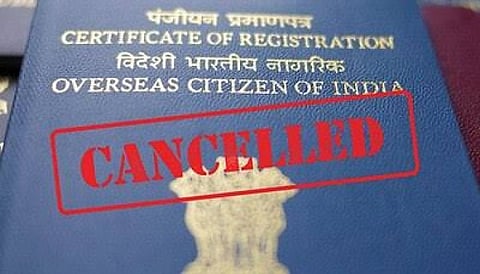

Prime Minister Narendra Modi frequently praises the accomplishments of the Indian diaspora during his international visits, yet he exhibits intolerance towards criticism from the same diaspora, thereby jeopardizing India’s democracy and progress.
Iftikhar Gilani
In recent times, a concerning trend has emerged, casting a shadow over the democratic principles that India has long cherished. Stringent measures against dissenting voices, particularly among the foreign diaspora and international academia, have sparked significant debate and concern.
This wave of actions includes denying entry to notable intellectuals, revoking Overseas Citizen of India (OCI) cards, and blacklisting journalists and content creators critical of government policies. Such measures not only threaten the essence of democracy but also raise questions about India’s commitment to freedom of expression and the right to dissent.
The case of Nitasha Kaul, a professor at the University of Westminster, who was denied entry into India despite being invited by a state government, exemplifies the government’s hard stance against ideological opposition.
This incident is part of a larger pattern, as revealed by a Right to Information (RTI) query, showing that over 100 OCI cards have been cancelled since 2014 for reasons often linked to criticism of government policies or support for movements deemed anti-government by the authorities. As many as 37 OCI cards were cancelled that year, followed by 24 cards in 2021, 31 cards in 2022 and 10 cards till May 2023.
The OCI card, which offers visa-free travel and residency rights to people of Indian origin, has become a tool for the government to regulate the entry and stay of critics abroad. The cancellation of OCI cards based on vague allegations of anti-India activities has profound implications for free speech and the right to dissent, impacting activists like Amrit Wilson and academics such as Ashok Swain.
Journalists and content creators have not been spared either. The deportation of journalist Angad Singh and the blacklisting of content creator Karl Rock for their critical coverage of government policies highlight the extent to which the government is willing to go to control the narrative and suppress dissenting views.
The case of British-American citizen Aatish Taseer, whose OCI status was cancelled allegedly for concealing his father’s Pakistani origin after writing a critical profile of Prime Minister Modi, further underscores the government’s intolerance towards critical media coverage.
Moreover, the targeting of foreign journalists and restrictions on their reporting activities constrain the space for free press and informed discourse. The cancellation of Vanessa Dougnac’s OCI card, for example, signals a worrying trend of using immigration controls to suppress unfavourable coverage.
Content creator and New Zealand citizen Karl Rock, who is married to an Indian, found out in October 2020 that he was blacklisted, when he applied for a new visa to enter India at the embassy in Dubai, according to a blog he posted on his website on 9 July 2021.
The legal framework surrounding OCI cancellations, particularly the contentious Section 7D of the Citizenship Act, has come under scrutiny. This provision grants the government broad powers to revoke OCI status, raising critical questions about the balance between state security interests and individual rights. Legal challenges against this provision highlight the tension between government authority and democratic freedoms.
The government’s actions against dissenting voices extend beyond the revocation of OCI cards and blacklisting. The arrest and subsequent legal challenges faced by individuals like Kannada actor Chetan Ahimsa for expressing their views on local issues further illustrate the crackdown on free expression.
The government’s stance, as articulated in court, that OCI cardholders cannot claim the right to free speech under the Indian Constitution because they are considered foreigners, reflects a narrow interpretation of democratic values. The same diaspora has made India proud abroad, a fact that Prime Minister Narendra Modi often states. But when the same diaspora points fingers at something going bad, they need to be heard patiently.
These stringent measures not only impact the individuals directly affected but also undermine the principles of transparency and accountability essential for a healthy democracy. The essence of democracy lies in its capacity to embrace diverse viewpoints, facilitate open dialogue, and uphold the fundamental rights of all individuals, regardless of their geographical or ideological position.
The pattern of suppressing dissenting voices through the cancellation of OCI cards and the blacklisting of critics raises profound concerns about the erosion of democratic values in India.
As India moves toward its general elections, the government must reflect on its actions and prioritize the restoration of democratic principles. The right to dissent, the protection of academic and journalistic freedoms, and the fostering of a culture of open debate are not just indicators of democratic health but are essential for the nation’s progress and its standing on the global stage.
The international community, along with Indian citizens at home and abroad, must remain vigilant and advocate for the safeguarding of these fundamental rights to ensure that democracy in the world’s largest democracy does not become a mere facade.
—–
Have you liked the news article?